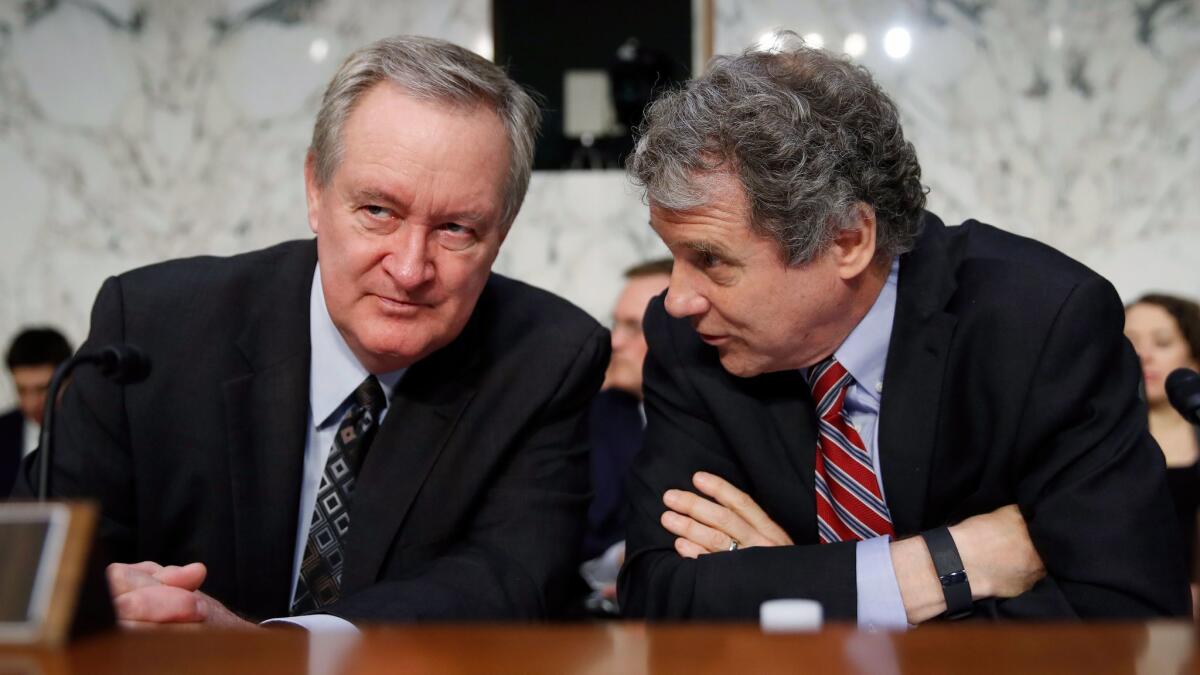Senate committee advances bipartisan measure rolling back some bank regulations

A Senate committee on Tuesday approved bipartisan legislation that is aimed at easing regulations on smaller banks but also provides significant benefits for many large financial institutions.
Supporters of the bill from Senate Banking Committee Chairman Mike Crapo (R-Idaho) — including nine Democrats and one independent — called it a sensible step to reduce burdens, mostly on community banks and credit unions, to make it easier for consumers to get mortgages and obtain credit.
Critics complained it goes too far in exempting about 30 banks and other firms from stricter oversight put in place after the 2008 financial crisis.
The committee voted 16 to 7 to send the bill to the full Senate. The panel’s 12 Republicans joined with four Democrats — Joe Donnelly of Indiana, Heidi Heitkamp of North Dakota, Jon Tester of Montana and Mark Warner of Virginia — in approving the measure.
The bill’s most significant provision would reduce the number of financial institutions that face heightened scrutiny required by the 2010 Dodd-Frank Wall Street Reform and Consumer Protection Act.
The legislation would raise the threshold for so-called systemically important financial institutions, which face annual stress tests and other enhanced regulations, to $250 billion in assets from the current $50-billion level.
That would provide significant relief for large firms such as State Street Corp., Charles Schwab Corp., Suntrust Banks Inc., and American Express Co., as well as U.S. operations of giant foreign banks, including Credit Suisse, Deutsche Bank and Barclays.
There would be no changes to the strict oversight of JPMorgan Chase & Co., Bank of America Corp., Wells Fargo & Co. and the 10 other largest banks in the U.S.
The bill also adds new protections in the wake of the massive Equifax Inc. data breach, allowing consumers to freeze and unfreeze their files with credit reporting companies and requiring free credit monitoring for active-duty members of the military.
“The reforms in this bipartisan bill help tailor the current regulatory landscape, while ensuring safety and soundness and relieving the burden on American businesses that are unfairly being treated like the largest companies in our economy,” Crapo said before his committee considered the bill.
The goal of reducing regulations for smaller banks has broad support, and Crapo worked with moderate Democrats to get enough on board to overcome the Senate’s 60-vote hurdle for most major legislation. Banking industry and business groups have indicated their support.
The Economic Growth, Regulatory Relief and Consumer Protection Act is much less ambitious than a sweeping Dodd-Frank overhaul passed by the House on a party-line vote in June.
That bill, for example, would eliminate the designation of any financial institution as systemically important, scrap the trading restrictions known as the Volcker Rule and gut the authority of the Consumer Financial Protection Bureau.
The House bill is more in line with the aggressive deregulatory approach of President Trump, who has called Dodd-Frank “a very negative force” in the economy and vowed during the campaign to dismantle it.
But strong Democratic opposition to major revisions in Dodd-Frank, one of the signature accomplishments of President Obama, means the House bill is highly unlikely to pass the Senate.
Some Senate Republicans said they supported Crapo’s bill but wanted it to cut regulations further. Sen. Patrick Toomey (R-Pa.) called it “mostly modest but constructive movement to lighten the burden of excessive and unnecessary regulation.”
He opposes the designation of financial institutions as systemically important. If the requirement is not repealed, Toomey said he’d prefer the designation be made case by case instead of being tied to an “arbitrary threshold.”
The bill’s limited reach led several moderate Democrats to sign on. They said the bipartisan process of drafting it was a stark contrast to the major tax bill approved last week by the Senate, which was crafted only by Republicans and received no Democratic votes.
“I am optimistic we can prove to the American people that we can break through the nonsense and find common ground,” said Tester, a moderate. He opposed the Senate tax bill but is one of four Democrats on the committee who helped draft the financial regulatory bill with Republicans.
There were 72 banks in Montana before the crisis, Tester said. Now there are 49, and he attributed that in part to the “one-size-fits-all” regulations that have made it tougher for small and midsized banks.
Heitkamp said Dodd-Frank needed changes.
“We tried to fix too-big-to-fail and we created too-small-to-succeed,” she said.
Other Democrats, particularly liberals, said they supported reducing burdens on small banks but opposed going easier on large financial institutions.
“If we learned anything from the financial crisis, it is that deregulation of the banks doesn’t create economic growth, instead it puts millions of Americans at risk — like the 5 million families who were foreclosed upon during the crisis,” said Sen. Sherrod Brown (D-Ohio).
Financial firms with assets of $50 billion to $100 billion would be exempted from the stricter oversight immediately, while those with assets of $100 billion to $250 billion would have to wait 18 months.
The Federal Reserve would still be required to conduct unspecified periodic stress tests for banks with assets of $100 billion to $250 billion, instead of annual ones. And Fed officials would have the authority to speed up the relief timetable or reapply the stricter oversight if it is deemed necessary.
The bill also would exempt banks with less than $10 billion in assets from the Volcker Rule, which prohibits federally insured banks from trading for their own profit and limits their ownership of risky investments. Banks of that size also would be exempted from new mortgage lending requirements if they keep the loans on their books instead of selling them.
Brown, Sen. Elizabeth Warren (D-Mass.) and several other Democrats on the committee tried unsuccessfully to amend the bill to scrap some regulatory reductions and add additional consumer protections. Some Democratic backers of the bill said they supported the amendments but joined with Republicans to vote them down to avoid endangering GOP support.
That led to the unusual sight of Democrats sparring with one another over whether the bill was a dangerous regulatory rollback.
“This legislation does not undermine Dodd-Frank,” Donnelly said. “This is good legislation. It is reasonable and balanced and the result of compromise, which is what we’re supposed to do.”
But Sen. Brian Schatz (D-Hawaii) noted that bank profits have been soaring in recent years.
“What a shame that the one place in the United States Senate we can find room for bipartisanship is to give relief to financial institutions, not on healthcare, not on education not even on foreign policy,” he said.
Twitter: @JimPuzzanghera
UPDATES:
2:35 p.m.: This article was updated with the Senate Banking Committee voting to approve the measure.
This article was originally published at 1:30 p.m.







